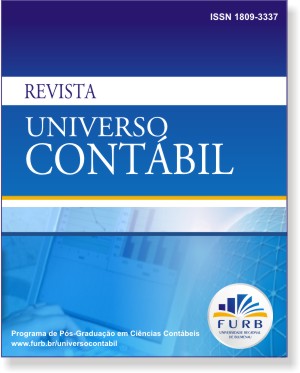ESTRUTURA CURRICULAR DO CURSO DE CIÊNCIAS CONTÃBEIS NO BRASIL VERSUS ESTRUTURAS CURRICULARES PROPOSTAS POR ORGANISMOS INTERNACIONAIS: UMA ANÃLISE COMPARATIVA
DOI :
https://doi.org/10.4270/ruc.20106Mots-clés :
Contabilidade, Educação contábil, Estrutura curricular.Résumé
As alterações ocorridas nas últimas décadas no ambiente de negócios têm afetado a atuação das empresas e, por conseqüência, o exercício da profissão contábil. Organismos internacionais como o IFAC, ISAR/UNCTAD, AICPA e AECC, preocupados com a capacidade das IES em formar profissionais contábeis capazes de atender às novas demandas dos empregadores, têm emitido relatórios que revelam as competências que os egressos dos cursos de Ciências Contábeis devem ter ao ingressar no mercado de trabalho visando, portanto, alinhar a estrutura curricular e as exigências do mercado. Nesse contexto, o objetivo desse artigo é apresentar um estudo comparativo das estruturas curriculares propostas pelo IFAC, ISAR/UNCTAD, AICPA e AECC e pela Resolução CNE/CES no. 10/2004, especialmente no que tange às competências, habilidades e atitudes que devem ser desenvolvidas. Os resultados indicam que as diretrizes curriculares que orientam o desenho dos currícula de Ciências Contábeis no Brasil reconhecem a necessidade do desenvolvimento de competências relacionadas à formação profissional, complementada por conhecimentos organizacionais, administrativos e de TI, além do desenvolvimento de habilidades como: comunicação, liderança e interpessoais, alinhando-se, assim, com as propostas de organismos como IFAC, ISAR/UNCTAD, AICPA e AECCTéléchargements
Téléchargements
Publié-e
Comment citer
Numéro
Rubrique
Licence
Os direitos autorais para artigos publicados nesta revista são do autor, com direitos de primeira publicação para a revista. Em virtude de aparecerem nesta revista de acesso público, os artigos são de uso gratuito, com atribuições próprias, em aplicações educacionais e não-comerciais. A revista permitirá o uso dos trabalhos publicados para fins não-comerciais, incluindo direito de enviar o trabalho para bases de dados de acesso público. Os artigos publicados são de total e exclusiva responsabilidade dos autores.
• O(s) autor(es) autoriza(m) a publicação do artigo na revista;
• O(s) autor(es) garante(m) que a contribuição é original e inédita e que não está em processo de avaliação em outra(s) revista(s);
• A revista não se responsabiliza pelas opiniões, ideias e conceitos emitidos nos textos, por serem de inteira responsabilidade de seu(s) autor(es);
• É reservado aos editores o direito de proceder ajustes textuais e de adequação do artigo às normas da publicação;
• O(s) autor(es) declaram que o artigo não possui conflitos de interesse.


